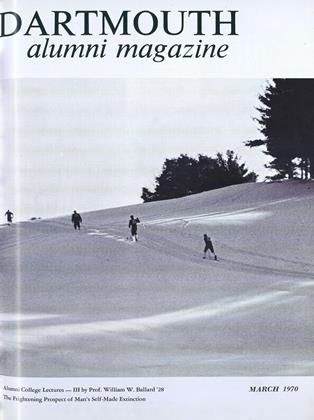"We are contributing daily to the crime problem, however unwittingly, through our present correctional machinery." This is the conviction of HENRY J. MASCARELLO '36, who, after 23 years as Executive Director of the Massachusetts Correctional Association, believes that the most effective way to attack the problem of crime is to restructure the correctional system and thus prevent the repetition of crime. "The bulk of serious crime is committed not by first offenders, but by those who have already passed through our correctional systems. Despite the magnificent efforts of many correctional administrators, the present procedures by which we return an offender to the community means that when he hits the streets, he is often a wide-open candidate for further crime. As many as two-thirds of the inmates leaving one of our major prisons today will commit further crime and be reimprisoned within four years."
As Mascarello expounds his views, one realizes that he must have been an effective teacher when he was a part-time instructor in criminology at Tufts University, 1940-45, and Boston University, 1956-57. His ability to communicate ideas and engender enthusiasm in his listeners makes him an excellent choice to head an organization such as the Massachusetts Correctional Association that is devoted to informing the public. Evolving from several older prison societies that offered direct aid to former inmates, the MCA continues to be concerned with the needs of ex-prisoners, but its primary efforts are now directed more toward public education, research, and obtaining legislative support for changes in the correctional system. As executive director of the 500-member, privately funded organization, Mascarello has responsibilities that vary from meeting with legislative committees to interviewing prison inmates on a radio program, or arranging informal conferences for judges and prison officials.
Henry Mascarello's interest in criminology began while he was a student at Dartmouth and studied psychology under Edwin Powers, A.M. '30. The two men have since worked together at the Massachusetts Correctional Association, where Powers was president and is now a director and research consultant.
After graduating from Dartmouth, Mascarello went to work for the Massachusetts State Prison for a year and then spent three years with the John Howard Society of Boston doing rehabilitation work with discharged prisoners. This experience led to his appointment in 1940 as Executive Director of the United Prison Association of Massachusetts, a forerunner of the Massachusetts Correctional Association. He has held that position ever since, except for 1958-65 when he transferred temporarily to other association work, a part of which involved the development of a new youth training program in Action for Boston Community Development. However, during this interim period he continued on the board of directors of the MCA. Recognition of his contributions to prison reform has led to his election to the board of the American Correctional Association and to the professional council of the National Council on Crime and Delinquency. More recently, because of his prominence in the field, he was appointed to the Massachusetts Criminal Law Revision Commission.
From Mascarello's point of view, before any significant reforms can be made to improve the correctional system there must be a change of attitude toward criminals. "The public must make up its mind - does it want to punish the offender according to his deeds or treat him according to his needs? You cannot do both and be convincing to the offender." Many of them suffer from serious medical, psychological, educational, or social defects, and they need more expert attention than they are usually given, he says.
"Throughout the whole correctional system there must be a more sophisticated attitude and a higher grade of sensitive personnel who have been carefully recruited and trained. Sensitivity follows understanding. I am convinced that my neighbor, for example, given solid information, in- stead of myths, will respond constructively to the complex reality of crime causation, prevention, and control." It seems important to Henry Mascarello, therefore, to do all he can through the Massachusetts Correctional Association to combat the simplistic approaches of "law and order" and instead to develop public understanding of the root issues confronting modern law enforcement and criminal justice.
Henry J. Mascarello '36 (r), executive director of the Massachusetts CorrectionalAssociation, with Charles W. Bartlett '27 (c), its president, and EdwinPowers, A.M. '30, former Dartmouth professor, who serves as consultant.
 View Full Issue
View Full Issue
More From This Issue
-
 Feature
FeatureThe Rise and Fall of Humanity
March 1970 By WILLIAM W. BALLARD '28, -
 Feature
FeatureTHE DICKEY ADMINISTRATION ENDS BUT NOT ITS PERVADING IMPRINT
March 1970 -
 Feature
FeatureDartmouth's Priorities for 1970
March 1970 -
 Article
ArticleThree Students Argue for Coeducation
March 1970 By CHERYL CAREY, Coed, RANDY PHERSON '71, RICHARD ZUCKERMAN '72 -
 Article
ArticleThe Undergraduate Chair
March 1970 By WINTHROP A. ROCKWELL '7O -
 Article
ArticleAn Antidote to Hugeness
March 1970 By CARLOS H. BAKER '32







